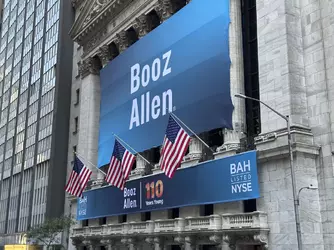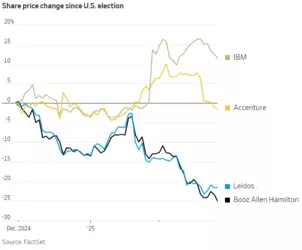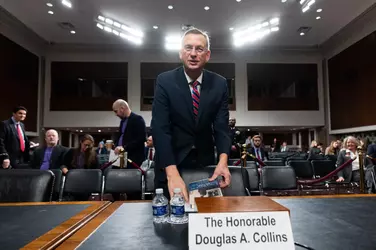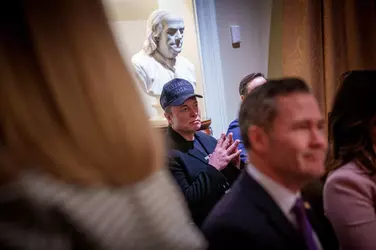By Chip Cutter
Feb. 28, 2025 5:00 am ET

Booz Allen employs more than 34,000 people to work on projects across the U.S. government. Photo: Peter Morgan/AP
The Trump administration is looking to cut federal contracts. Few companies stand as exposed as Booz Allen Hamilton.
The venerable Washington, D.C., area firm works on projects across the U.S. government. It operates a website visitors use to reserve campsites at national parks. It is modernizing healthcare records for veterans, beefing up technology at the Federal Bureau of Investigation, and rolling out a suite of artificial-intelligence and cybersecurity tools across the Department of Defense and other federal agencies.
A memo sent this week from Stephen Ehikian, the acting administrator of the General Services Administration, calls on procurement officials at federal agencies to list and justify consulting contracts from 10 companies—including Booz Allen, Accenture, Deloitte and IBM—that the agencies intend to keep. The responses are due March 7.

Booz Allen generates 98% of its roughly $11 billion in annual revenue from contracts in which the end client is a U.S. government agency or department. It has told investors that it sees the U.S. government as the world’s largest consumer of management consulting and technology services. Since the election of President Trump in November, its stock is down about 30%.
In the memo, viewed by The Wall Street Journal, Ehikian said the GSA has identified that the 10 highest-paid consulting firms are set to receive more than $65 billion in fees in 2025 and future years. “This needs to, and must, change,” Ehikian wrote, bolding the sentence for emphasis.
Some consulting firms say it is unclear how the $65 billion figure was calculated. A spokesperson for the GSA didn’t immediately respond to a request for comment.
Ever since 1940, when Booz Allen took on a project advising the secretary of the Navy ahead of World War II, the company has had a foothold in the federal government. Booz Allen separated its corporate-consulting arm from its government-advisory business in 2008, with the government business retaining the original name.

Booz Allen CEO Horacio Rozanski said the company has been through presidential transitions before, and will weather the reviews of federal contracts. Photo: Andrew Harnik/Getty Images
Today, the company, which employs more than 34,000 people, operates not as a consulting firm but as a technology company, CEO Horacio Rozanski said in an interview. Booz Allen says it now has one of the largest AI businesses in the federal government. About 70% of its employees work in technology today, up from about 20% in 2012.
Booz Allen has been through presidential transitions before, and will weather the reviews of federal contracts, Rozanski said. The company’s work also aligns with the Trump administration’s priorities, he said.
“We recognize that in the short-term there could be some disruption to the market, but in the long-term we are really well aligned,” he said. “If the government wants to operate with fewer people, it will need to operate with more technology, and technology that works. And our stuff works, and it works beyond the prototype.”
The Elon Musk-led Department of Government Efficiency has already claimed to cut a small number of Booz Allen contracts, including at the Labor Department and the Commerce Department. Some of the company’s competitors, such as Accenture and Deloitte, have also had contracts cut. Spokespeople for Accenture and Deloitte didn’t immediately respond to requests for comment.
Accenture got 17% of its North American revenue from the U.S. government last year. Another big federal contractor, Leidos, got about 87% of its revenue from the government providing national security and technology services, including scanners at airport checkpoints.

VA Secretary Doug Collins said the department was canceling nearly $2 billion in contracts. Photo: Bill Clark/Zuma Press
A range of government officials have recently taken aim at consultants. In a post on X Tuesday, Doug Collins, the Department of Veterans Affairs’ newly confirmed secretary, said the VA was canceling nearly $2 billion in contracts. “No more paying consultants to do things like make Power Point slides and write meeting minutes!” he wrote.
The VA said earlier this week that no final decisions have been made, but nonmission-critical contracts, in areas such as executive support and coaching, will be eliminated.
Booz Allen’s Rozanski said the company is already talking to Trump officials about how the government can deploy its technology on everything from space defenses to using AI to reduce fraud.
“We are not in the business of writing PowerPoints. We’re in the business of writing code and of using commercial technology to create real results in the federal government,” he said.

The Elon Musk-led Department of Government Efficiency has already claimed to cut a small number of Booz Allen contracts. Photo: Andrew Harnik/Getty Images
The GSA memo also asks that agencies justify consulting contracts by explaining why they are “mission critical” and provide substantive technical support. The exact impact of the review remains to be seen, said Stan Soloway, CEO of the consulting firm Celero Strategies, and the former head of the largest trade association of government-service contractors.
“There’s a lot of questions,” Soloway said.
It is unclear what “mission critical” means, and how it might align with existing agency budgets and goals, said Soloway, a former defense official under President Bill Clinton. Executives within firms are trying to meet with Trump administration officials or explain the value of their services, but see the potential cuts as a risk.
“A lot of these companies are doing serious technology work,” Soloway said. “Now they don’t even know what the next six months or year might hold. Nothing disturbs a market more than uncertainty.”
Source (Archive)
Feb. 28, 2025 5:00 am ET

Booz Allen employs more than 34,000 people to work on projects across the U.S. government. Photo: Peter Morgan/AP
The Trump administration is looking to cut federal contracts. Few companies stand as exposed as Booz Allen Hamilton.
The venerable Washington, D.C., area firm works on projects across the U.S. government. It operates a website visitors use to reserve campsites at national parks. It is modernizing healthcare records for veterans, beefing up technology at the Federal Bureau of Investigation, and rolling out a suite of artificial-intelligence and cybersecurity tools across the Department of Defense and other federal agencies.
A memo sent this week from Stephen Ehikian, the acting administrator of the General Services Administration, calls on procurement officials at federal agencies to list and justify consulting contracts from 10 companies—including Booz Allen, Accenture, Deloitte and IBM—that the agencies intend to keep. The responses are due March 7.

Booz Allen generates 98% of its roughly $11 billion in annual revenue from contracts in which the end client is a U.S. government agency or department. It has told investors that it sees the U.S. government as the world’s largest consumer of management consulting and technology services. Since the election of President Trump in November, its stock is down about 30%.
In the memo, viewed by The Wall Street Journal, Ehikian said the GSA has identified that the 10 highest-paid consulting firms are set to receive more than $65 billion in fees in 2025 and future years. “This needs to, and must, change,” Ehikian wrote, bolding the sentence for emphasis.
Some consulting firms say it is unclear how the $65 billion figure was calculated. A spokesperson for the GSA didn’t immediately respond to a request for comment.
Ever since 1940, when Booz Allen took on a project advising the secretary of the Navy ahead of World War II, the company has had a foothold in the federal government. Booz Allen separated its corporate-consulting arm from its government-advisory business in 2008, with the government business retaining the original name.

Booz Allen CEO Horacio Rozanski said the company has been through presidential transitions before, and will weather the reviews of federal contracts. Photo: Andrew Harnik/Getty Images
Today, the company, which employs more than 34,000 people, operates not as a consulting firm but as a technology company, CEO Horacio Rozanski said in an interview. Booz Allen says it now has one of the largest AI businesses in the federal government. About 70% of its employees work in technology today, up from about 20% in 2012.
Booz Allen has been through presidential transitions before, and will weather the reviews of federal contracts, Rozanski said. The company’s work also aligns with the Trump administration’s priorities, he said.
“We recognize that in the short-term there could be some disruption to the market, but in the long-term we are really well aligned,” he said. “If the government wants to operate with fewer people, it will need to operate with more technology, and technology that works. And our stuff works, and it works beyond the prototype.”
The Elon Musk-led Department of Government Efficiency has already claimed to cut a small number of Booz Allen contracts, including at the Labor Department and the Commerce Department. Some of the company’s competitors, such as Accenture and Deloitte, have also had contracts cut. Spokespeople for Accenture and Deloitte didn’t immediately respond to requests for comment.
Accenture got 17% of its North American revenue from the U.S. government last year. Another big federal contractor, Leidos, got about 87% of its revenue from the government providing national security and technology services, including scanners at airport checkpoints.

VA Secretary Doug Collins said the department was canceling nearly $2 billion in contracts. Photo: Bill Clark/Zuma Press
A range of government officials have recently taken aim at consultants. In a post on X Tuesday, Doug Collins, the Department of Veterans Affairs’ newly confirmed secretary, said the VA was canceling nearly $2 billion in contracts. “No more paying consultants to do things like make Power Point slides and write meeting minutes!” he wrote.
The VA said earlier this week that no final decisions have been made, but nonmission-critical contracts, in areas such as executive support and coaching, will be eliminated.
Booz Allen’s Rozanski said the company is already talking to Trump officials about how the government can deploy its technology on everything from space defenses to using AI to reduce fraud.
“We are not in the business of writing PowerPoints. We’re in the business of writing code and of using commercial technology to create real results in the federal government,” he said.

The Elon Musk-led Department of Government Efficiency has already claimed to cut a small number of Booz Allen contracts. Photo: Andrew Harnik/Getty Images
The GSA memo also asks that agencies justify consulting contracts by explaining why they are “mission critical” and provide substantive technical support. The exact impact of the review remains to be seen, said Stan Soloway, CEO of the consulting firm Celero Strategies, and the former head of the largest trade association of government-service contractors.
“There’s a lot of questions,” Soloway said.
It is unclear what “mission critical” means, and how it might align with existing agency budgets and goals, said Soloway, a former defense official under President Bill Clinton. Executives within firms are trying to meet with Trump administration officials or explain the value of their services, but see the potential cuts as a risk.
“A lot of these companies are doing serious technology work,” Soloway said. “Now they don’t even know what the next six months or year might hold. Nothing disturbs a market more than uncertainty.”
Source (Archive)



